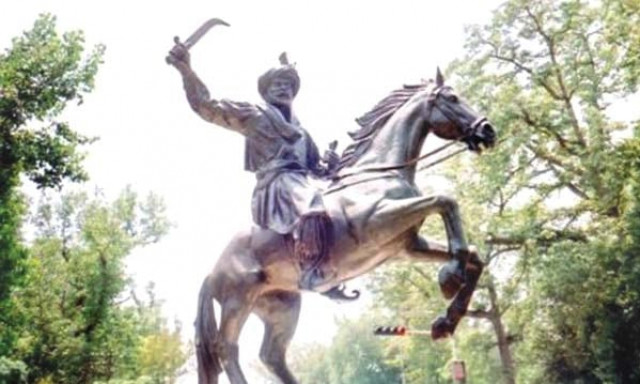Bakht Khan: shrouded by the sands of time
An important leader in the 1857 war, Khan's life records are vague and sketchy.

“Saheb-i-Alam Bahadur” (Lord Governor General), better known as General Bakht Khan, was a prominent figure in the history of the Indian freedom movement of 1857. He was a subedar in the East India Company’s army, a veteran of the First Anglo-Afghan War with almost forty years of experience in the Bengal Horse Artillery.
The War of Independence began when a group of sepoys mutinied against the introduction of rifle cartridges that were allegedly greased with lard or tallow, an affront to Muslims and Hindus respectively. The uprising soon became an all-out civilian rebellion against the company.
When he heard of the events in Meerut, Bakht Khan marched to Delhi to support Mughul King Bahadur Shah Zafar’s army with the Rohilla sepoys at his side.
When he arrived in Delhi in July, the city had already been taken and Bahadur Shah had been proclaimed Emperor of India. Though the commander of the Mughal forces was crown prince Mirza Mughal, his lack of military experience was a hindrance, and the Rohilla leader was appointed as an unofficial leader of the army.
Bakht Khan’s superior leadership and military knowledge was clearly evident, so the emperor later bestowed upon him full authority and the title “Saheb-i-Alam Bahadur”.
Bakht Khan’s first move was to abolish taxes on articles of common consumption and penalise hoarding, to generate goodwill with the masses.
But his leadership and bravery could not compensate for the lack of organisation and relative lack of supplies and strength of the Mughal forces. Delhi was besieged on June 8 and after the British assaulted the Kashmiri Gate, Bahadur Shah fled to Humayun’s tomb against Bakht Khan’s pleas.
After the fall of Delhi and the army’s subsequent surrender on September 20, 1857, Bakht joined freedom fighters in Luckow and Shahjahanpur. Later, he is said to have gone to Nepal where he is believed to have been killed by English forces and buried in the graveyard of Nanser (Koz Band) in Swat.
The alternate theory
However, according to G H Kits, General Bakht was neither captured nor traced, and historians in Swat claim that it was there that he came when the war was lost. Bakht Khan spent his later life under the protection of the Akhound of Swat.
Historian Fazal Mahmood Rokhan says, “General Bakht Khan was called ‘The Prince’ by Swati people of the day but they had no knowledge of his role as a freedom fighter. He kept his heroic past to himself to keep the British away.”
Professor Shad Khan, a former professor at Jahanzeb College, Saidu Sharif, said, “I would go to the tomb of a brave man with my grandmother, who told me that this is the tomb of the ‘Prince’ who had fought bravely against the English. It was the tomb, not of a prince from India, but a general, Bakht Khan.”
Rokhan said, “I have regularly visited the tomb of the unknown prince (presumably Bakht Khan) with Professor Shad Khan and have seen its condition deteriorate over the decades.”
He added that the grave was once looted by gravediggers hoping to find treasure as many consider him a saint. Incidentally many people continue to visit the grave, hoping the “prince” will answer their prayers.
Great nations always keep records of their heroes. Unfortunately, no research into the life of this hero of the War of Independence was ever conducted, and in line with the claims of his final years by Swat’s historians, Bakht Khan’s memory lives as he died. In anonymity.
With additional input by Vaqas Asghar.
Published in The Express Tribune, January 27th, 2011.













COMMENTS
Comments are moderated and generally will be posted if they are on-topic and not abusive.
For more information, please see our Comments FAQ